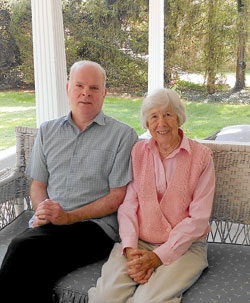A Very Patient Advocate
By the time her fifth child, Joseph, was born in 1963, Ruth Christ Sullivan (M.A. ’53) was an experienced public health nurse who’d run children’s health workshops in rural Louisiana. She knew what kids were like – enough to know that Joseph was different.
An extremely agile and bright child, he began rocking at 18 months old. He also stopped talking, screamed all night long and avoided eye contact. “I had seen just about any disability you can think of,” Sullivan explains. “What I was seeing didn’t fit with anything I had ever seen or heard of.” When none of the doctors in her area could enlighten her, Sullivan took her son to a monthly clinic held by an out-of-town psychiatrist who was up on current research. He spoke the words that changed her life:
“Your child is autistic.”
The term “parent activist” didn’t yet exist, but Sullivan quickly became one. As she met with psychiatrists and read the literature, she discovered that medical wisdom blamed autism on “refrigerator” mothers who did not love their children. Infuriated, she reached out to other parents of autistic children, in 1965 cofounding the Autism Society of America (now known as the National Society for Autistic Children/Autism Society of America).
Her efforts were sorely needed. Children with autism generally were not welcome in the public schools, which balked at the expense of providing one-on-one attention. “They stayed at home, and they were hidden,” Sullivan says. “Either they were in an institution, or the family took care of them – meaning the women, of course, for the most part.” In fact, placements were so scarce that when the Sullivans found a school in Huntington, West Virginia, offering classes for kids with autism, they moved there from upstate New York.
Finding a program for her son only made Sullivan more aware of the vast unmet need nationwide. “There was nothing in the law that said schools had to take kids with autism. I knew I had to start at the federal law level.”
When Sullivan began lobbying with the Autism Society of America, the organization had so little money that she once camped out at the airport until she could hitch a ride on a private plane headed east to Washington. Her work helped lead to the passage of the Education for All Handicapped Children Act (Public Law 94-142) in 1975, but children with autism were not protected under the Act. Sullivan continued to lobby, organizing parents to go to D.C. “We had a breakfast one time where we invited all the legislators on important committees,” she recalls, “and we made sure to seat them all next to kids and their mothers, so they could see what autism was.” Finally, in 1991, the Individuals with Disabilities Education Act was passed, specifically guaranteeing children with autism the right to an education.
Still, it wasn’t until the movie Rain Man came out in 1988, starring Dustin Hoffman, that autism really penetrated the national consciousness. Hoffman interviewed Ruth and Joseph Sullivan as he prepared for his role as an adult with the disorder. Sullivan, ever alert to opportunity, suggested that the movie open in Huntington, and Hoffman agreed. Huntington’s Autism Services Center, which Sullivan founded, used proceeds from the opening to purchase the first of 13 group homes for autistic adults.
Joseph Sullivan now lives in one of those homes and holds a part-time job. Ruth Sullivan, now 88, retired five years ago after a career that included founding several local and state chapters of the National Society for Autistic Children as well as the organization’s National Information and Referral Service. She also led the creation of the National Association of Residential Providers for Adults With Autism and assisted in founding the National Autism Society of Argentina. Somehow, she also found time to launch and direct the center in Huntington, providing three counties with an increasingly broad range of educational and support services.
Two years ago, Sullivan received TC’s Distinguished Alumna Award – the latest in a series of well-deserved honors. She takes walks, goes to movies and tries to sleep late whenever she isn’t fielding calls from worried parents or interested journalists. “There were a lot of hard times and very little sleep. I’ve been trying to make up for it,” she says. That, and straightening up around the house. “Most people my age have already done their 25 years of cleaning closets, but I’m just getting to it.”
Published Friday, Dec. 7, 2012
